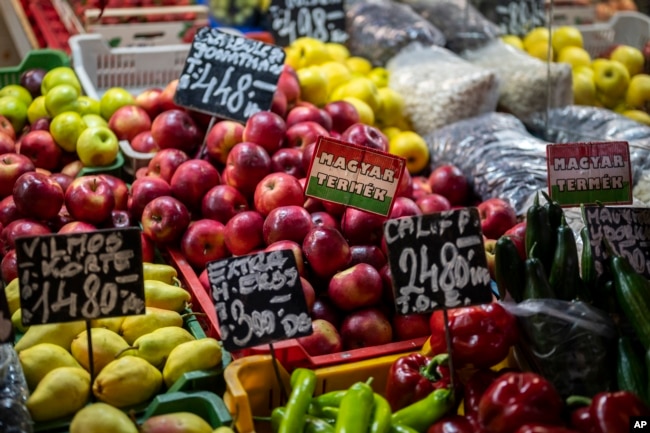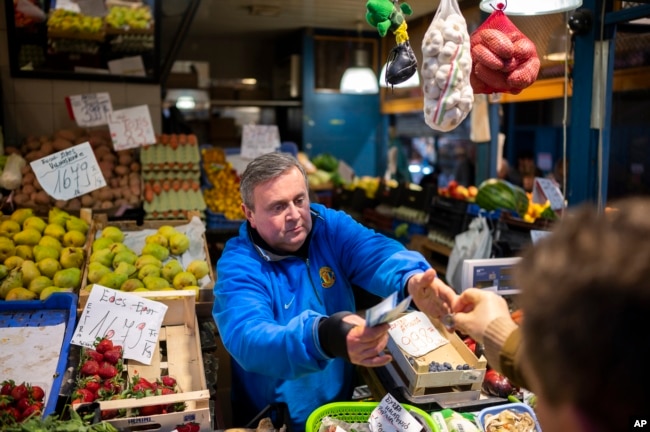Food Prices Fall on World Markets but not for Most People

The global market prices of grains, vegetable, milk-based and other agricultural products have been falling. The price drops, however, have not yet made it to everyday buyers around the world. Around the world, food prices are staying painfully high.
Food prices were already high when Russia invaded Ukraine in February of 2022. The invasion caused major problems to the grain and fertilizer trade. Food prices rose quickly.
But on a global level, that price shock ended a while ago. The United Nations says global food prices have fallen for 12 straight months. Good harvests in places like Brazil and Russia and a wartime agreement that permitted grain shipments out of the Black Sea helped lead to the drop in food prices.
Yet, prices at food stores are still rising. And that affects people everywhere, from the United States and Europe to struggling countries in the developing world.
Food prices were 19.5 percent higher in the European Union last month compared to a year earlier and 19.2 percent higher in Britain.
Joseph Glauber is former chief economist at the U.S. Department of Agriculture. He said that the cost of agricultural products is just one reason for the continued high cost of food.
In the United States, food prices were up 8.5 percent last month compared to one year earlier. Glauber said that “75 percent of the costs are coming after it leaves the farm.”

Domestic harvested fruits and vegetables are displayed in Budapest's Grand Market Hall on April 8, 2023. (AP Photo/Denes Erdos)
He added, “It’s energy costs. It’s all the processing costs. All the transportation costs. All the labor costs.”
Food inflation, Glauber said, “will come down, but it’s going to come down slowly, largely because these other factors are still running pretty high.”
Another reason for high food prices in the United States, observers say, is a wave of mergers that have reduced competition in the food industry.
White House officials last year noted that just four companies control 85 percent of the U.S. beef market. Beef is meat that comes from cows. Similarly, just four companies control 70 percent of the pork market and 54 percent of the poultry market. Pork meat comes from pigs; poultry is meat from birds including chickens and ducks.
Those companies, critics say, can use their market power to raise prices.
Glauber, who is now a researcher at the International Food Policy Research Institute, is not sure that mergers are the reason for high food prices. He agreed that big agribusinesses can bring in profits when prices rise. But things usually even out over time. And their earnings go down in other times.
“I couldn’t point my finger at the fact that we just have a handful of meat producers,” Glauber said.
In other countries, Glauber said, a strong U.S. dollar is to blame for keeping food prices high. In other high food price times, the dollar was not as strong.
Glauber said prices for corn and wheat are given in dollars per ton. Because of the strong dollar, people in other countries have not felt the price drops that have shown up in global food markets.
In Hungary, people are increasingly unable to deal with the biggest increases in food prices in the E.U., reaching 45 percent in March.

József Varga, owner of a grocery in Budapest's Grand Market Hall, sells vegetables on April 8, 2023. (AP Photo/Denes Erdos)
Joszef Varga is a fruit and vegetable seller in Budapest historic Grand Market Hall. He said wholesale costs have risen by 20 to 30 percent. All his buyers have felt the increased prices – some more than others.
“Those with more money in their wallets buy more, and those with less buy less,” he said.
In Pakistan, store owner Mohammad Ali said some customers are no longer buying meat. They buy more vegetables and beans instead. But even the price of vegetables, beans, rice and wheat are up as much as 50 percent.
Sitting in her home outside Pakistan’s capital of Islamabad, 45-year-old Zubaida Bibi said, “Our life was never easy, but now the price of everything has increased so much that it has become difficult to live.”
Words in This Story
global – adj. involving the entire world
factor – n. something that helps produce or influence a result
merger – n. the act or process of combining two or more businesses into one business
wallet – n. a small folding case that holds paper money or credit cards
https://learningenglish.voanews.com/a/food-prices-fall-on-world-markets-but-not-for-most-people/7073822.html